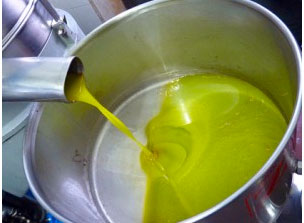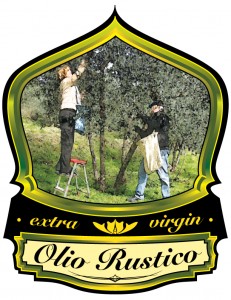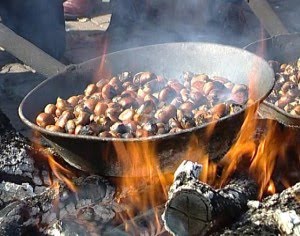 November is a glorious time in Umbria. The grape harvest has been recently completed, the olive harvest is underway and all the stores and restaurants are trumpeting vino novello and olio nuovo. I was at my local butcher and I asked him the difference between nuovo and novello,because as far as I could figure out, they both meant “new”.
November is a glorious time in Umbria. The grape harvest has been recently completed, the olive harvest is underway and all the stores and restaurants are trumpeting vino novello and olio nuovo. I was at my local butcher and I asked him the difference between nuovo and novello,because as far as I could figure out, they both meant “new”.
A spirited discussion ensued among the small crowd of customers waiting in line
for prosciutto, the end result of which was that there is no difference between the two words, but no one would be caught dead saying olio novella or vino nuovo.
If you did, they would think you were a German.
Olio nuovo does not travel. If anyone tries to sell it to you at Dean and Deluca or Eataly, sneer at them and say that you have to be there to get the experience of new oil, just pressed today. By “there” I mean the hills of central Umbria where truly fine olive oil is pressed from the local fruit. I know this because we have been picking that fruit for the last two weeks and will be for the next three.
 On our knees, on ladders in
trees, stripping the fruit from the branches with our chilly fingers.
Whenever we get 30 or so kilos, we schlep them down to the frantoio, have them weighed and then run downstairs to watch our oil pour out the little pipe.
On our knees, on ladders in
trees, stripping the fruit from the branches with our chilly fingers.
Whenever we get 30 or so kilos, we schlep them down to the frantoio, have them weighed and then run downstairs to watch our oil pour out the little pipe.
Then we come back home and start picking the next thirty kilos. The
oil that flows from that pipe gives off the combined fragrances of
new-mown grass and a fruity musk that, to my nose, is right up alongside
freshly-baked yeasty bread as one of the finest smells in the universe.
Angel’s Crotch might be a proper name for it if we were to bottle it.
But that smell is nothing compared to the taste when you dip a piece of
unsalted Umbrian bread into this newest of new oil and pop it into your
mouth. That’s a ticket to Heaven.
Vino novello is like fame; it comes and goes in a minute. It’s doesn’t just mean “new wine,” which would be essentially unfermented; Vino Novello is actually made with a different — accelerated — fermentation process, similar to that of Beaujolais Nouveau. The entire fermentation takes place in 20 days and it produces a lovely, fruity, low-alcohol wine, completely free from tannins. It’s wonderful this year. It’s either better than I remember or my memory’s not what it used to be. One or the other. It seems deeper, fuller tasting this year.
 There are chestnuts everywhere – the famous marroni
picked in the forests surrounding Spoleto, roasted in a cast-iron pans
over wood coals, served hot at your table with glasses of Novello. We had ours this week at L’Alchimista, a wonderful restaurant and wine shop situated on the main piazza in Montefalco.
There are chestnuts everywhere – the famous marroni
picked in the forests surrounding Spoleto, roasted in a cast-iron pans
over wood coals, served hot at your table with glasses of Novello. We had ours this week at L’Alchimista, a wonderful restaurant and wine shop situated on the main piazza in Montefalco.
Chestnuts and vino novella were brought out for our dessert, after a great meal that featured two other specialties of the season – black celery (sedano nero) and sausages from the town of Trevi. Black celery isn’t black. It’s just a little darker and more intense in flavor than the celery we know. And the stalks are much longer. I had my sedano nero and sausage in a bowl of home-made tagliatelle at L’Alchimista, and I ate very well indeed.
Michael Tucker is an actor and author whose third book is the recently published Family Meals: Coming Together to Care for an Aging Parent. You can read more about his food adventures on his blog Notes from a Culinary Wasteland.
